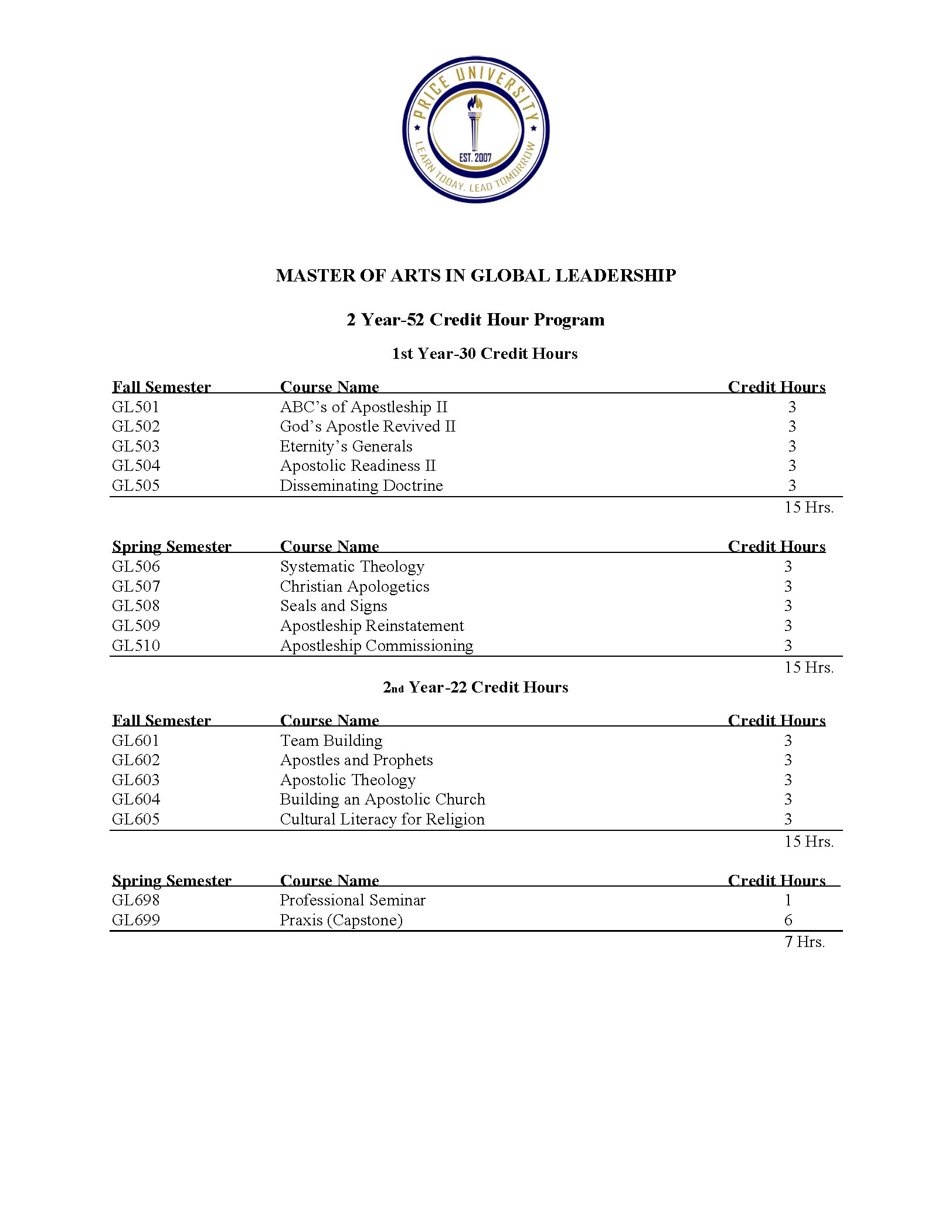Global Leadership
Master's DegreeMaster of Arts – Global Leadership
Program Purpose: The purpose of this program is to educate, equip and arm students for the world of the 21st Century leadership so they enter their respective offices and office as more than missionaries, evangelists, pastors, or doctrinal adherents. Those entering this program will engage in a multi-dimensional education process that has the twofold effect of communicating God’s knowledge to the world and transforming the traditional ministerial consciousness from soul winning to that of a representative of Jesus Christ’s monarchical reign on earth.
Program Description
The Master of Arts in Global Leadership program is an advanced study of worldwide leadership rooted in Matthew 28:18-20; Ephesians 2:20, 1 Corinthians 12:28,29, Acts 26:18 and several other apostle dominant scriptures.Its foundation is restoration of divine order through the authoring mantles of God’s word. Students will learn eternal and ecclesial apostleship as designed and ordained by God. That is before and since the church was brought to earth by God’s spirit.
Core fundamentals weave its elements, features and functions throughout God’s leadership spectrum to portray the difference apostleship makes in the world, its institutions, nations, and citizens.
Subject matter spans the leadership are from God’s perspectives relative to His duties, responsibilities, obligations, governance, and sovereignty over the kingdoms of this world.
A highly interactive course, that paints a comprehensive picture of apostleship and its architecture to install within those called to this office, its principle effect is how it instills scripture’s brand of apostleship as modeled by Jesus and His apostles.
Program Objectives
The objectives of the Master of Arts in Global Leadership are: To initiate or build on prior studies in this subject in order to delve into deeper or more breakthrough study of this subject that sets the tone for increasingly comprehensive treatment of the subject pursuant to graduate degree;
- Engage lectures and discussions that include query response sessions on subject that educate and instill its most virile concepts and principles in the students, thereby assuring they have sufficient information to pass the program, and ample material to complete assignments;
- Identify, etymologize, and pragmatize key terminologies to promote students’ cogent application of course subject material;
- To teach the office and mantleship of the Biblical Apostle so students transition from a classic ecclesial ministry mindset to that of Jesus Christ and His founding apostles;
- To transmit scripture’s pattern of apostolic thought, deed, strategy, tactic, and operation so students realize its importance to God’s leadership ideals;
- To anatomize the office and its officers to present those best suited to institute and execute apostleship as the Lord ordained and finds most conducive to His purposes and will;
- To define verbally and illustratively what an apostle is, why the office and its mantleship are essential to Christianity and Jesus’ Kingship so students are informed enough to recognize and answer the call and launch an apostleship entity that corresponds to Scripture’s model;
- To disclose the indivisible bond between apostleship and a commission, God’s government, the Old and New Testament, and God’s eternal Continuum in ways that interlink and interlock them all in God’s service;
- To sketch the typical apostle’s ministry as a model for students to follow;
- To articulate and evince the marks of an authenticate apostleship from God’s word so students visualize and aspire to His design of the office as His future servants;
- To present the human attributes and assets of Biblical Apostleship, that best express its operations in the modern world;
- To outline the distinctives of an apostle’s intelligence to enable students to detect them in active service;
- To instruct students in apostleship’s Bible prescribed duty to Jesus Christ, founder, sustainer and perpetuator of this office;
- To convey the pragmatism apostle’s leadership style, exemplify the marks of the officer’s dispensation and mandated curative powers;
- To train students in the legitimacies of the office to conquer its traditional resistance and discredit;
- To furnish students with knowledges and knowhow to construct a modern-day protestant apostolate (ecclesial embassy) and provide instruction on how to identify, select, equip, and engage or deploy those to serve it;
- To make strong actionable connections between the apostle and the ambassador, the ecclesia, and an embassy;
- To link all teachings and actions to leadership in general and apostleship leadership, teaching students how to globalize their leadership perspective and how to practicalize them for God’s church, leadership, and the world’s leaders;
- Enable students to successfully produce coursework and submission that meet completion criteria for passing the program with an 80% or better grade.
- R2 Years (Four Semesters)
- R45 Credit Hour Program
- R3.0 GPA or Higher to Pass
- RDownload Degree Plan
Got Questions? Call us at 877-419-1299.
Program Details
Entrance Requirements
What is C.O.R.E.?
CORE is the Common Office Requirement Education for training and developing future ministry officers.
Completion Requirements
Students must complete their degree program with passing grade 3.0 or higher in major core course requirements. Student must take a minimum of 45 credit hours with Price U to meet graduation requirements.
Program Outcomes
The outcomes for the Master of Arts in Divine Communications are the:
- Ability to reflect the presence of a highly endowed and disciplined Prophet’s spirit evidenced in apparent assimilation of subject matter theories, enactments, standards, and protocols.
- Ability to discern scriptural from non-scriptural prophetics regardless of the environment or platform it appears.
- Ability to saturate this world with prophetic genre, its necessities, values, and benefits so today’s sketchy ecclesial education on this subject is replaced with coherent, uniform education that restores it credibility.
- Ability to populate the world with highly educated and technically skilled prophets and prophetics, divine communicants, and spiritually adept ministers of Christ’s model of prophets and prophetic service.
- Ability to teach and replicate Scripture’s prophetic brand.
- Ability to register by observation and rank by comparison the twelve classes of Prophets and assist with their office’s staffing.
- Ability to practice superior prophetics to the advantage of the Lord Jesus’ high ecclesial and governmental agencies and officials.
- Ability to dissect and diagnose Scripture and contemporary prophecies.
- Ability to pierce prophetically and probe the souls of those served to initiate deliverance and ignite healing.
- Ability to convey God’s word as His Divine Communicant in a way that secures and restores His reputation in the church and the world.
- Ability to articulate God’s governing organs, uphold them as His prophet and enact them (or advise their enactment) according to the prototypical patterns set forth in scripture.
- Ability to comparatively profile Scripture’s prophets, their similarities, and differences to detect and validate them for modern prophets to relate to in their calling.
- Ability to demonstrate grade 4 and above prophetics to exhibit capacity for advanced prophetic placement and complex prophetic duties and responsibilities.
- Ability to petition for a Prophetic ED agency and to staff and operate it profitably.
- Ability to manifest prophetic capabilities beyond prophesying.
- Ability to discharge the prophet’s office as more than a verbalizer or predictant by pressing into its institutional realms.
- Ability to identify, educate, screen and deploy advanced prophets without resorting to paganism to do so.
- Ability to contemporize ancient prophetics for the modern world and God’s endtime agenda.
- Ability to defend and accredit contemporary prophetics persuasively in diverse settings and conflicts.
- Ability to shift 21st Century prophetic focus to its originator, Scripture.
- Ability to utilize divine communications education to accomplish the University’s motto, V.I.V.A.S and S.O.C.U. mandates in all contexts of public ministry.
- Ability to find accurate and reliable means of assuring the messages people get from the Lord’s divine communicants are authentic, relevant, producible, and performable.
- Ability to incorporate this program information to the practical divine communications ministry.
- Ability to apply the knowledge learned in a practical capstone project based on real world issues confronting the prophetic ministry.
- Ability to complete course and degree qualifying requirements successfully, including written and verbal examination, oral defense, presentment of created material or concept, demonstration of subject mastery; when assigned, completed field studies, extensive research and its outcomes that proves theories or shows success in casework and satisfactorily completed internship or apprenticeship of 500 or more hours.
Homework, Assignments, Submissions, Tracking
The program syllabus and student requirements will be available through the student portal access. Lectures will be conducted online as necessary throughout their program.
Access to online lectures will be given through the Student Portal Access.
Quizzes and Exams will also be completed through the portal’s class instructions and other requirements will be explained for each assignment.
Students will receive assignments, upload assignments, and see their grades inside of their portal.



